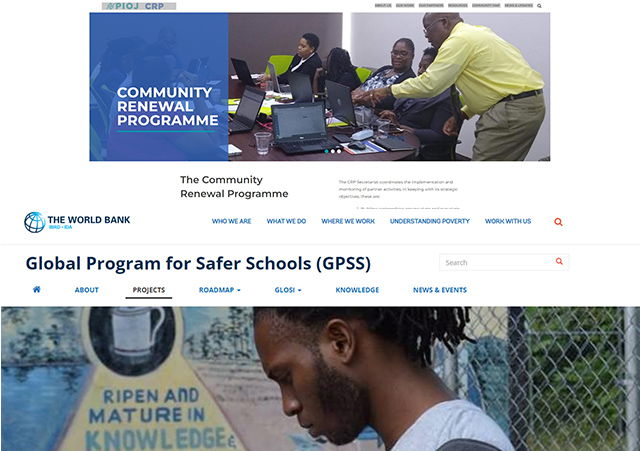 [Top] Website of Jamaica's Community Renewal Programme. [Bottom] Jamaica Safer Schools Project [photo credit: Utech / Ja JSSP Team / World Bank]
[Top] Website of Jamaica's Community Renewal Programme. [Bottom] Jamaica Safer Schools Project [photo credit: Utech / Ja JSSP Team / World Bank]
[This an excerpt from an article in The Round Table: The Commonwealth Journal of International Affairs.]
Conclusion
This article has assessed both the conceptualisation and application of violence within the Jamaican context. It has explored the continued transformation of violence from a political act to one that is not just a key aspect of the global production chain in illicit markets but is now firmly established as a product component. Finally, it examined the structural, transnational, politically motivated, and economically driven components of violence as well as the mutually reinforcing dynamics between corruption and violence. It has been argued that a comprehensive understanding of violence requires a shifting away from moral and cultural perceptions of violence towards a view of violence as a strategic economic tool.
Jamaica’s crime eradication approach, although multi-layered, has focused predominantly on a combination of social intervention programmes and law enforcement anti-gang measures and techniques. Some of these social intervention programmes include: the Citizens Security and Justice Programme (CSJP) initiative of the Ministry of National Security; the Community Renewal Programme (CRP) established by the Planning Institute of Jamaica (PIOJ); and the Safe Schools Programme supported by the World Bank. This is partnered with law enforcement measures and techniques, such as improving the legal framework for arrests (forensic analysis), intelligence, and combat training, and providing upgraded and improved crime-fighting resources. The Government has also sought to implement Zones of Special Operations (ZOSOs) that allow law enforcement agencies to carry out targeted use of force in key communities. Jamaica has historically been proactive in eradicating crimes and reducing violence. However, these initiatives focus on root causes and understanding the legitimate use of state-driven violence. This is not to say that the Jamaican government has not directed any policy initiatives towards economic improvement, but there has been little focus on violence eradication policies framed around the political economy of the conceptualisation and application of violence within Jamaica. There is an urgent need to revise our understanding of violence to one that extends beyond cultural and moral components. It is only then that Jamaica can truly craft policy initiatives geared at reducing the levels of crime and violence in the country.
Find out more about the Commonwealth Round Table and the Round Table Journal
This article showed that state and criminal non-state actors frame violence differently. At its core, the state is a political actor where violence legitimises its authority, and its power is tied to an identified population within a territorial space. Violence is therefore a political tool used to maintain the rule of law and to provide the stability required for citizens to engage safely and profitably in political and economic life. However, violence is an economic tool for criminal non-state actors. A complex, multifaceted, and dynamic tool that can be used strategically altered to fit economic interests. As criminal non-state actors are typically characterised as poor, jobless and uneducated youths, ‘violent work’ provides opportunities to ensure their economic survival and to become self-made men.
State, Institutions and Competitiveness: The Urgency of Institutional Capacity-Building in Jamaica
The Jamaica – Britain border and drug trafficking
With localities such as garrison communities and global markets, violence is utilised in multiple ways. Violence is separated from any local illegal product and is marketed as a separate brand. Here, it is designed to capture global markets interested in utilising the services and expectations that come with the use of violence that is primarily ‘Jamaican’. This includes, but is not limited to, global players hiring a brand at a specific stage of distribution or transshipment for a wide range of goods and services. Violence is also fused with localised illegal goods and services to maximise profits and to protect and expand market share. Violent illegal goods concern trans-local turf wars and the exertion of waves of influence from local outwards.
Ironically, the more untethered violence comes from its moral and cultural components: the more it is applied tactically as an economic tool, the more geography matters. This is because it gives the poor disenfranchised segments of Jamaican society a greater opportunity to become part of the global market and to engage with other illicit economic actors with whom they would not have crossed paths before. Globalisation highlights the Jamaican location and market for potential buyers and sellers. It alerts illicit economic actors looking for increased profits through niche markets, and branding and access to persons within prime geo-politically relevant spaces to engage in illicit activities. The ability of violence and violent work to lift them up by their boot straps, is limited only by their creativity and boldness. Once we recognise violence as one component in an evolving economic landscape, then and only then will we truly realise that geography matters the most, and that effective violence eradication policies must account for the political economy of violence and its geographical importance in the global market.
Michelle A. Munroe is a Lecturer in Political Science, Department of Government, Faculty of Social Sciences, University of the West Indies, Mona, Jamaica.



